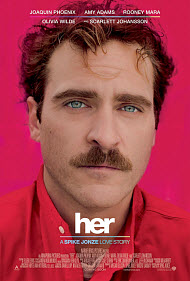Her
 for language, sexual content and brief graphic nudity.
for language, sexual content and brief graphic nudity.
Reviewed by: Andrea McAteer
CONTRIBUTOR
| Moral Rating: | Extremely Offensive |
| Moviemaking Quality: |
|
| Primary Audience: | Adults |
| Genre: | Sci-Fi Romance Comedy Drama |
| Length: | 1 hr. 59 min. |
| Year of Release: | 2013 |
| USA Release: |
December 18, 2013 (limited—6 theaters) January 10, 2014 (wide—1,700+ theaters) DVD: May 13, 2014 |








Loneliness
Phone sex
Masturbation
SEXUAL LUST—What does the Bible say about it? Answer
PORNOGRAPHY—How can I tell if I’m getting addicted to pornography or sex? Answer
TRUE LOVE—What is true love and how do you know when you have found it? Answer

Learn how to make your love the best it can be. Discover biblical answers to questions about sex, marriage, sexual addictions, and more.




| Featuring |
|---|
|
Joaquin Phoenix … Theodore Scarlett Johansson … Samantha (voice) Amy Adams … Amy Chris Pratt … Paul Rooney Mara … Catherine Bill Hader … Chat Room Friend #2 Kristen Wiig … SexyKitten (voice) Olivia Wilde … Blind Date Brian Cox … Alan Watts See all » |
| Director |
|
Spike Jonze |
| Producer |
|
Annapurna Pictures Megan Ellison … producer See all » |
| Distributor |
Well, what to say about this movie. It’s odd. Oftentimes, ridiculous. About halfway through this film, it finally occurred to me, perhaps the writer/director was trying to say something. Trying to use this film on a deeper level to teach us something, say something or point something out. Only then did “Her” become …. Tolerable.
Theodore Twombly (Joaquin Phoenix) is a quiet loner who works for a letter writing company. People give him information they want to communicate to another person, and he writes (dictates to a computer) the letter. We find out that Theodore is married, and he and his wife are going through a divorce, but he has yet to sign the papers.
Theodore becomes intrigued by a new technology—an Operating System, OS. Upon purchasing and installing, it, he is surprised by how life-like the OS seems, due to its human traits—voice inflection, ability to read verbal cues such as hesitancy or sadness. The OS “Samantha” (voiced by Scarlett Johansson) feels very real to him. He begins to truly enjoy his interactions with Samantha, sharing his daily life with her. She replaces his loneliness.
He “takes” her to a fair, talking to her and allowing her to lead the way by holding out the camera based device and closing his eyes. I thought, how strange he looked holding out the interactive device, spinning around and laughing, yet no one in the film seems to think it is odd. It seems commonplace. As time goes on, Theodore calls Samantha his girlfriend and admits to others he is in a relationship with an OS, however in time, Theodore becomes jealous and eventually comes to terms with the fact that she is not real.
We have become such an electronic society. Go anywhere that a wait is required, say, a doctor’s office, and no one can just sit there and wait—they have to be on an electronic device. My own children take an electronic device in the car for a 5 minute ride to a friend’s house, where they plan on playing another electronic device. How often do you text instead of call? Personally, I have found myself texting a new parent I don’t know well, instead of picking up the phone and calling to arrange get togethers with the kids. On Facebook, many people post so much of the details of their daily lives, or message friends, but don’t call or actually get together. We have replaced human interaction with electronic communication, to a fault, I think.
Maybe this movie is a commentary on our current dependency on electronic devices and how our reliance on such devices and “conveniences” has replaced human interaction. I think and hope, this is the point of this film, otherwise it is just dribble.
Another thing I noticed is the drab clothing. Men wear high-waisted pants that are hardly fashionable. Amy (Amy Adams) wears gray clothing, no makeup and her hair is loosely pulled up in a slightly sloppy style. There isn’t anyone overly attractive. Looks seem to be downplayed. Everyone blends in. I feel this somehow ties into the overall point of the film, thinking maybe this allows us to focus on the people themselves, who they are and their relationships, not what they look like.
This movie is not only odd, but very offensive. Near the beginning, Theodore has phone sex and the woman on the phone asks him to fantasize about becoming violet towards her with a dead cat. At that point my thought was, “I wonder if I left now, could I get my money back?” I stayed in order to do this review. While speaking to this woman on the phone, Theodore envisions a pregnant naked woman. Top frontal nudity is shown. This same pregnant woman was shown earlier, nude but with private parts covered with her arms.
Theodore and “Samantha” have sex… so to speak. The screen goes black, but they describe what they would do and there is plenty of moaning and heavy breathing, and it is quite clear what is going on. There is a mention of Internet pornography. Anal sex is mentioned and a bizarre drawing is shown of how it would look if certain anatomy were in different places on the human body. A cartoon mom in a game is made to grind against a refrigerator.
Vulgar language abounds—F-word and forms of it 32 times, S-word 11 times, God’s name in vain (7), 2 extremely crude references to female genitalia and 3 for male genitals. There is more, but I don’t think I really need to go on. I think you get the point.
I strongly advise all to skip this film. Jesus says in Matthew 6:22-23, “The eye is the light of the body, if your eye is good, your whole body will be full of light. If your eye is bad, your whole body will be dark.” In the words of the old children’s Sunday school song “Be careful little eyes what you see… be careful little ears what you hear.”
There is nothing edifying about this movie, in spite of what I interpret as an attempt to comment on the human need for companionship and our dependence on technology. In the film, Theodore asks Samantha why she sighs, that is a human affectation, a need for oxygen, and she does not need oxygen. The movie closes with Theodore sighing, driving home that human element that the latest technology cannot ever replace.
If you have any desire to see an interesting film where technology can be manipulated to then manipulate our own interests, find the film “S1m0ne (Simone).” It is far less crude and much more fun and unique.
- Language: Extreme
- Sex/Nudity: Extreme
- Violence: Minor
See list of Relevant Issues—questions-and-answers.


Moral rating: Offensive / Moviemaking quality: 4
First of all, I think it was a shame that Scarlett Johansson couldn’t be nominated for an Oscar for her portrayal of Samantha, since she employs love, warmth, humor, anger, silliness, jealousy, and a whole range of emotions into Samantha, making her more real than a lot of real women in movies. The beauty of “Her” is that Theodore falls for Samantha because he is in love with her heart and personality and the performance given by Scarlett Johansson makes us understand why. See all »
Moral rating: Offensive / Moviemaking quality: 4½
Without giving too much away, I was offended by Theo’s job of writing “personal” letters for total strangers—and also I assume “She” must have broken a confidentiality agreement between Theo and his employer. Other people around Theo raved about his writing skills but the content of his short notes was, in my opinion, just as ordinary as everything else in this film. One important aspect of the movie, if I understood correctly, is that “She” is not so much Theo talking to a woman but Theo talking to himself as he got through a divorce he didn’t seek and didn’t want—this could be the saving grace of “Her” because I do know of many Christians who enter marriage thinking it would be for life but learned their partners wanted out, which is so hard to endure they must discuss their situation with others at great length or go mad—a sad condition for many Christians and non-Christians alike.
As much as we like to think of ourselves as unique, we all want to be loved and often despite the millions of people around us, we feel all alone—so we, like Theo, talk to ourselves.
One important message I got from “Her” is that we shouldn’t become too attached to any thing—be it another person or a high-tech gadget. I absolutely did not like the “porn” (a few short silly segments at the start of the film) but I noticed that Theo’s interest in it quickly faded, perhaps because what he experienced that way was so weird. I only looked at reviews of “Her” after seeing the movie but cannot understand why so many people rave about it, including a married couple in my city who, according to a local news report, have seen “Her” three times and even on Valentine’s Day because there was no other “date” movie showing that Friday night.
Moral rating: Offensive / Moviemaking quality: 3
By no means would I consider “Her” transgressive in terms of what movies typically are—I would however, consider it better funded and better promoted than most movies of its kind. By virtue of this, the concepts presented in it are new to much of its audience, and, when prompted, let’s face it—no one, regardless of what they believe, wants to think about these concepts as it relates to them personally. Our reviewer, Andrea McAteer, found good themes when she… touched on companionship and technology dependence. Those two are definitely there, most specifically the companionship aspect. But what I believe to be the thesis of the story lays underneath those two themes: the question of what constitutes life. See all »
Moral rating: none / Moviemaking quality: 4½
This whole movie was a great example of the kind of idolization that God despises. In Exodus 20 v2 it says that you should not serve any god except our God. Even though the OS in the movie was not a god, it was still something that the man adored and idolized, and if we Christians make the mistake of doing this, we may be condemning ourselves.
Moral rating: Average / Moviemaking quality: 4
PLEASE share your observations and insights to be posted here.

Once he “meets” Samantha, he slowly blossoms. Through her, he sees the world anew, experiences the joy, love, and hope that still exists. Their relationship is refreshingly touching and based entirely on mutual emotional/mental connection, rather than physical attraction.
However, the science behind Samantha is disturbing—an issue to both Theodore and the audience. After all, she sounds human, displays human emotions/desires and exercises free will. She is a very sympathetic character, who struggles with her identity and her place in the world. Very relatable. But it is this very factor that made me uncomfortable, because she is just an artificially intelligent computer program. Her existence brings up some interesting topics for discussion, such as: What does it mean to be alive?
My Ratings: Moral rating: Offensive / Moviemaking quality: 4